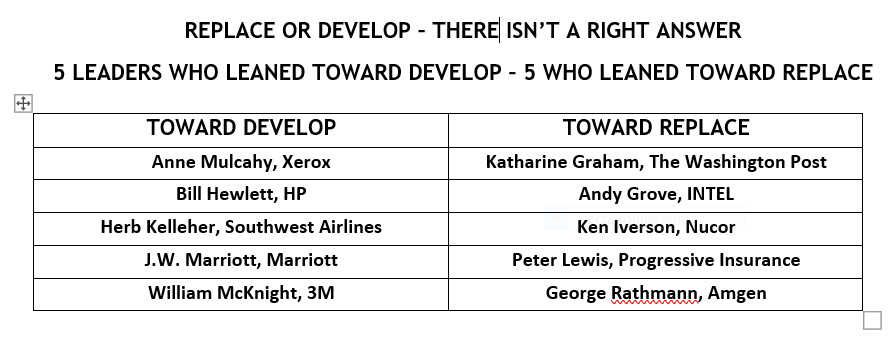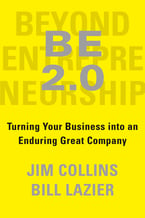 Which way do you tilt?
Which way do you tilt?
- Invest more to develop the person or…
- Act decisively to replace the person. (Note: Replacing doesn’t necessarily mean kicking him or her off the bus; you might move them to a different seat.)
There’s no single right answer. The best leaders, see a 50/50 split between those who tilted toward development and those who tilted toward replacement. In Beyond Entrepreneurship 2.0: Turning Your Business into an Enduring Great Company by Jim Collins and Bill Lazier, Collins shares the following leaders as examples of develop or replace your people.
- If you fall in Develop: In retrospect, you wait too long before you act to move the person out of the key seat.
- Falling in Replace: you acted too quickly, and you should have been more patient.
 It’s easier to know when you make a Develop mistake, especially if Replace mistakes leave the company. Every organization struggles with the tension between developing and replacing people in key seats. No leader gets it right every single time.
It’s easier to know when you make a Develop mistake, especially if Replace mistakes leave the company. Every organization struggles with the tension between developing and replacing people in key seats. No leader gets it right every single time.
The best executives care deeply about their people, which is why they wait too long. But they improve their judgment over time.
How Do You Know when to Develop or Replace?
How do you know you’ve crossed the demarcation line? When is it time to shift from “develop” to “replace” for a key seat?
Collins shares his thoughts, distilled over years of reflection, down to seven questions to stimulate your thinking when you face the “develop or replace” conundrum.
- Are you beginning to lose other people by keeping this person in the seat? The best people want to work with the best people, and if they sense chronic tolerance for mediocre performance in key seats, they might leave. If you tolerate high-performing people who behave contrary to your core values, true believers lose heart and become cynical, and some will leave. There’s no better way to destroy a great culture than to retain people in key seats who fail to perform or run roughshod over the company’s core values.
- Do you have a values problem, a will problem, or a skills problem? If someone in a key seat behaves consistently or flagrantly contrary to the core values of the enterprise, the best leaders replace them. If someone passionately embraces the core values of the enterprise and has the indomitable will to do whatever it takes to master his or her seat, you can be more patient before reaching a decision to replace them in that seat. The hardest call comes with the question of will. Does the person lack (or has the person lost) the will to develop the demands of the seat? If not, can you ignite their will? Great leaders never underestimate how much people can grow, but they also know that growth depends on humility and relentless will to improve.
- What’s the person’s relationship to the window and the mirror? The right people in key seats display window-and-mirror maturity. When things go well, the right people point out the window, giving credit to factors other than themselves; they shine a light on other people who contributed to the success and take little credit themselves. And when things go awry, they don’t blame circumstances or other people for setbacks and failures; they point in the mirror and say, “I am responsible.” People who look in the mirror—who always ask, “What could I have done better? What did I miss?”—will grow. People who always point out the window to explain away problems or affix blame elsewhere will be stunted in their growth. Watch Collins explain The X Factor of Truly Great Leadership – Humility (1:59)
- Does the person see work as a job or a responsibility? The right people in key seats understand that they don’t have “jobs”; they have responsibilities. They grasp the difference between their task list and true responsibilities. A great doctor doesn’t merely have the “job” of performing procedures but embraces responsibility for the health of the patient. A great coach doesn’t merely have the “job” of preparing workouts but embraces responsibility for building his or her players into better people. A great teacher doesn’t merely have the “job” of being in the classroom from 8 a.m. to 3 p.m. but embraces responsibility for every child’s learning. Every person in a key seat has a broader responsibility than a task list, and the right people never hide behind “I got the tasks done” as an excuse for failing to deliver on the broader responsibility.
- Has your confidence in the person gone up or down in the past year? Confidence in a person rises or falls based on his or her growth and performance. The critical variable is the trajectory of that confidence over time. When someone says, “Got it!” do you increasingly set your worries aside, or do you increasingly feel the need to follow up?
- Do you have a bus problem or a seat problem? Sometimes you might have the right person on the bus but in the wrong seat. You might have put the person in a seat misaligned with his or her capabilities or temperament. Or perhaps—and this happens frequently in high-growth companies—the demands of a seat might have grown to outstrip the capabilities of the person in that seat.
- How would you feel if the person quit? If secretly relieved, then you might have already concluded that he or she is the wrong person on the bus. If genuinely distraught, then you might well believe he or she is still the right person on the bus.
To create an environment where everyone is inspired to give their best, contact us today to schedule a free exploratory meeting.
Growth demands Strategic Discipline.
Building an enduring great organization requires disciplined people, disciplined thought, disciplined action, superior results, producing a distinctive impact in the world.
Discipline sustains momentum, over a long period of time, laying the foundations for lasting endurance.
A winning habit starts with 3 Strategic Disciplines: Priority, Metrics and Meeting Rhythms. Forecasting, accountability, individual, and team performance improve dramatically.
Meeting Rhythms achieve a disciplined focus on performance metrics to drive growth.
Let Positioning Systems help your business achieve these outcomes on the Four most Important Decisions your business faces:
|
DECISION |
RESULT/OUTCOME |
|
PEOPLE |
|
|
STRATEGY |
|
|
EXECUTION |
|
|
CASH |
|
Positioning Systems helps mid-sized ($5M - $250M) business Scale-UP. We align your business to focus on Your One Thing! Contact dwick@positioningsystems.com to Scale Up your business! Take our Four Decisions Needs Assessment to discover how your business measures against other Scaled Up companies. We’ll contact you.
 NEXT BLOG – Freedom in a Framework
NEXT BLOG – Freedom in a Framework
Paying attention to the tactical execution of your vision and strategy is crucial to corporate greatness. We’ll discuss Tactical Execution from BE 2.0 and why routine sets you free in our next blog.






.jpeg?width=150&height=135&name=Hand%20with%20marker%20writing%20the%20question%20Whats%20Next_%20(1).jpeg)

